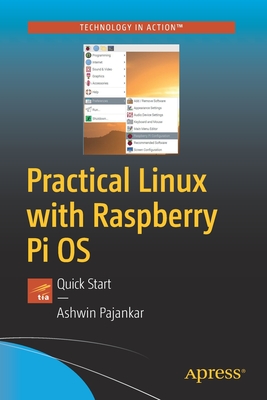Raspberry Pi Supercomputing and Scientific Programming: MPI4PY, NumPy, and SciPy for Enthusiasts
暫譯: 樹莓派超級計算與科學程式設計:為愛好者提供的MPI4PY、NumPy與SciPy
Ashwin Pajankar
- 出版商: Apress
- 出版日期: 2017-05-25
- 定價: $1,650
- 售價: 8.0 折 $1,320
- 語言: 英文
- 頁數: 196
- 裝訂: Paperback
- ISBN: 1484228774
- ISBN-13: 9781484228777
-
相關分類:
Raspberry Pi、Python
立即出貨 (庫存=1)
買這商品的人也買了...
-
 SELinux: NSA's Open Source Security Enhanced Linux (Paperback)
SELinux: NSA's Open Source Security Enhanced Linux (Paperback)$1,510$1,434 -
 Introduction to Algorithms, 3/e (Hardcover)
Introduction to Algorithms, 3/e (Hardcover)$1,750$1,715 -
 $234ZigBee 技術開發 — Z-Stack 協議棧原理及應用
$234ZigBee 技術開發 — Z-Stack 協議棧原理及應用 -
 Deep Learning (Hardcover)
Deep Learning (Hardcover)$1,650$1,617 -
 OpenCV + VTK + Visual Studio 影像辨識處理, 2/e
OpenCV + VTK + Visual Studio 影像辨識處理, 2/e$650$507 -
 $300Python 數據可視化之 matplotlib 實踐
$300Python 數據可視化之 matplotlib 實踐 -
 Machine Learning Algorithms: Popular algorithms for data science and machine learning, 2nd Edition
Machine Learning Algorithms: Popular algorithms for data science and machine learning, 2nd Edition$2,000$1,900 -
 Hands-On Data Visualization with Bokeh: Interactive web plotting for Python using Bokeh
Hands-On Data Visualization with Bokeh: Interactive web plotting for Python using Bokeh$1,050$997 -
 物件導向 ANSI-C 與 Python 的結合
物件導向 ANSI-C 與 Python 的結合$490$441 -
 Deep learning 深度學習必讀 - Keras 大神帶你用 Python 實作 (Deep Learning with Python)
Deep learning 深度學習必讀 - Keras 大神帶你用 Python 實作 (Deep Learning with Python)$1,000$790 -
 Python 玩轉樹莓派 GPIO 控制 (附光碟)
Python 玩轉樹莓派 GPIO 控制 (附光碟)$560$504 -
 極詳細 + 超深入:最新版 TensorFlow 1.x/2.x 完整工程實作
極詳細 + 超深入:最新版 TensorFlow 1.x/2.x 完整工程實作$1,200$1,020 -
 超入門實作 Python AIoT 智能物聯網 - 使用 Raspberry Pi 4B (iPOE R0+R1)
超入門實作 Python AIoT 智能物聯網 - 使用 Raspberry Pi 4B (iPOE R0+R1)$550$495 -
 Python 非同步設計|使用 Asyncio (Using Asyncio in Python )
Python 非同步設計|使用 Asyncio (Using Asyncio in Python )$480$379 -
 AIOT 與 OpenCV 實戰應用:Python、樹莓派、物聯網與機器視覺, 2/e
AIOT 與 OpenCV 實戰應用:Python、樹莓派、物聯網與機器視覺, 2/e$500$425 -
 軟體架構原理|工程方法 (Fundamentals of Software Architecture: A Comprehensive Guide to Patterns, Characteristics, and Best Practices)
軟體架構原理|工程方法 (Fundamentals of Software Architecture: A Comprehensive Guide to Patterns, Characteristics, and Best Practices)$680$537 -
 可程式控制器 PLC, 4/e (含機電整合實務)(附範例光碟)
可程式控制器 PLC, 4/e (含機電整合實務)(附範例光碟)$400$360 -
 AutoML 自動化機器學習:用 AutoKeras 超輕鬆打造高效能 AI 模型 (Automated Machine Learning with AutoKeras: Deep learning made accessible for everyone with just few lines of coding)
AutoML 自動化機器學習:用 AutoKeras 超輕鬆打造高效能 AI 模型 (Automated Machine Learning with AutoKeras: Deep learning made accessible for everyone with just few lines of coding)$690$621 -
 PLC 可程式控制實習與專題製作使用 FX2N / FX3U - 最新版(第四版) - 附 MOSME 行動學習一點通:加值
PLC 可程式控制實習與專題製作使用 FX2N / FX3U - 最新版(第四版) - 附 MOSME 行動學習一點通:加值$550$495 -
 $351面向共融機器人的自然交互 — 多模態交互信息的情感分析
$351面向共融機器人的自然交互 — 多模態交互信息的情感分析 -
 MySQL 資料庫開發的樂趣 (MySQL Crash Course: A Hands-on Introduction to Database Development)
MySQL 資料庫開發的樂趣 (MySQL Crash Course: A Hands-on Introduction to Database Development)$580$458 -
 快速搞懂 AI 人工智慧:我能運算你、取代你、終結你
快速搞懂 AI 人工智慧:我能運算你、取代你、終結你$350$273 -
 為你自己學 Python
為你自己學 Python$600$474 -
 Spring Boot 零基礎入門:從零到專案開發,古古帶你輕鬆上手(iThome鐵人賽系列書)
Spring Boot 零基礎入門:從零到專案開發,古古帶你輕鬆上手(iThome鐵人賽系列書)$720$561 -
 WordPress 超圖解 + No-code 7堂課:不只打造優質專業網站,還要帶你經營獲利與擁抱社群 (iThome鐵人賽系列書)
WordPress 超圖解 + No-code 7堂課:不只打造優質專業網站,還要帶你經營獲利與擁抱社群 (iThome鐵人賽系列書)$650$507
相關主題
商品描述
Build an inexpensive cluster of multiple Raspberry Pi computers and install all the required libraries to write parallel and scientific programs in Python 3. This book covers setting up your Raspberry Pis, installing the necessary software, and making a cluster of multiple Pis.
Once the cluster is built, its power has to be exploited by means of programs to run on it. So, Raspberry Pi Supercomputing and Scientific Programming teaches you to code the cluster with the MPI4PY library of Python 3. Along the way, you will learn the concepts of the Message Passing Interface (MPI) standards and will explore the fundamentals of parallel programming on your inexpensive cluster. This will make this book a great starting point for supercomputing enthusiasts who want to get started with parallel programming.
The book finishes with details of symbolic mathematics and scientific and numerical programming in Python, using SymPi, SciPy, NumPy, and Matplotlib. You’ll see how to process signals and images, carry out calculations using linear algebra, and visualize your results, all using Python code. With the power of a Raspberry Pi supercomputer at your fingertips, data-intensive scientific programming becomes a reality at home.
What You Will Learn
- Discover the essentials of supercomputing
- Build a low-cost cluster of Raspberry Pis at home
- Harness the power of parallel programming and the Message Passing Interface (MPI)
- Use your Raspberry Pi for symbolic, numerical, and scientific programming
Who This Book Is For
Python 3 developers who seek the knowledge of parallel programming, Raspberry Pi enthusiasts, researchers, and the scientific Python community.
商品描述(中文翻譯)
建立一個低成本的多個 Raspberry Pi 電腦集群,並安裝所有必要的庫,以便在 Python 3 中編寫並行和科學程序。本書涵蓋了如何設置您的 Raspberry Pi、安裝所需的軟體,以及如何建立多個 Pi 的集群。
一旦集群建立完成,就必須通過在其上運行的程序來充分利用其性能。因此,Raspberry Pi 超級計算與科學編程教您如何使用 Python 3 的 MPI4PY 庫來編碼集群。在此過程中,您將學習消息傳遞介面(Message Passing Interface, MPI)標準的概念,並探索在低成本集群上進行並行編程的基本原理。這將使本書成為希望開始學習並行編程的超級計算愛好者的絕佳起點。
本書最後介紹了使用 SymPi、SciPy、NumPy 和 Matplotlib 進行符號數學和科學及數值編程的細節。您將學習如何處理信號和圖像,使用線性代數進行計算,並可視化您的結果,所有這些都使用 Python 代碼。擁有 Raspberry Pi 超級計算機的強大功能,數據密集型的科學編程在家中變成現實。
您將學到什麼
- 探索超級計算的基本要素
- 在家中建立低成本的 Raspberry Pi 集群
- 利用並行編程和消息傳遞介面(MPI)的力量
- 使用您的 Raspberry Pi 進行符號、數值和科學編程
本書適合誰
Python 3 開發者,尋求並行編程知識的 Raspberry Pi 愛好者、研究人員以及科學 Python 社群。













